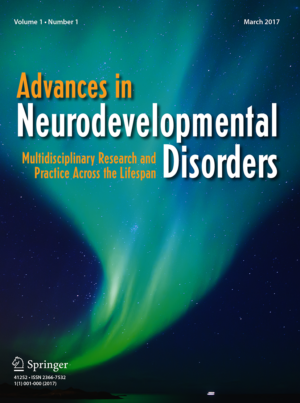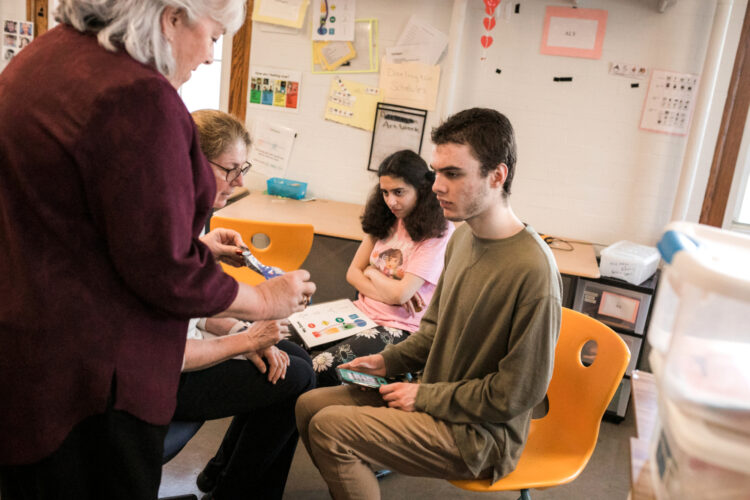Resources & Research
The Groden Network directs and supports comprehensive research as a part of its mission to assist children and adults with autism, developmental disabilities, and behavioral challenges to lead productive, dignified, and satisfying lives.
"Autism is stressful"
The idea that autism is stressful was the catalyst for Dr. June Groden’s research on stress, anxiety, and how it affects people with autism spectrum disorder (ASD).
This research led to the creation of her stress survey, used by behavioral specialists to help identify situations that are stressful for their clients. Upon identifying those situations, clients can then use coping strategies, such as relaxation or imagery to reduce their stress. The relaxation program can also be used to develop self-control by the individual learning to make a relaxation response in place of the typical maladaptive behavior he or she exhibits during stressful situations.
Dr. Cooper Woodard, Ph.D. and his team continue to engage in new research; honoring the hallmarks of innovation, creativity, and functionality begun by Drs. June and Gerry Groden.
Recently Published Work
This research was an expansion of our previously conducted Stress Survey Schedule for Children, a study co-authored by Dr. Cooper Woodard, Dr. Janette Baird from Brown University, research assistant Kaitlyn Anderson, and Dr. June Groden. The purpose of this project was to examine how stressors change as a person with autism ages into adulthood.
Study Abstract
Objectives
The purpose of this research was to expand upon the available normative data on the Stress Survey Schedule (SSS) for a group of adults with intellectual disabilities and autism spectrum disorder (ASD). This scale was originally designed in 2001 to measure stress in persons with ASD. Normative data were previously collected for a group of children and adolescents, and a secondary aim of this study was to compare the present adult data set to the historical child/adolescent data set.
Methods
This was a retrospective observational study that utilized SSS collected between 2021 and 2023. Survey response data were collected on 89 adults with intellectual disability and ASD, ages 22 to 66. Normative data were generated and explored and then compared to the historic child/adolescent sample.
Results
The average “Ritual-related” subscale score was significantly higher and the “Pleasant Events” subscale score was significantly lower compared to all other average subscale scores in the overall adult group. There were very few differences in the average subscale, average total, or raw total scores by age group or autism diagnosis status. Survey items frequently scored as high or low stress were consistent with these results. In comparing younger and older participant data, significant differences were found in average subscale scores in a number of areas, mainly with higher scores for the adult sample.
Conclusions
For adults, high stress often stems from events related to ritualized behavior, and events that are pleasant are typically endorsed as low stress for both adult and child samples. Stress levels appear to peak in early adulthood and then slowly diminish. There are significant differences between the child and adult samples, but social and environmental changes since the SSS was created in 2001 suggest the need for separate and revised versions of the survey.
To read the complete study visit: Adult SSS Article 2023
The Groden Network is pleased to announce that our most recent research project, "The Stress Survey Schedule (SSS): Trends and Normative Data on a

Sample of Children with Severe Autism and Related Developmental Disabilities," has been accepted for publication in Advances in Neurodevelopmental Disorders.
This research project was co-authored by Dr. Cooper Woodard, Dr. Janette Baird from Brown University, research assistant Kaitlyn Anderson, and Dr. June Groden. The purpose of this project was to examine and make use of the many Stress Survey Schedules (SSS) that had been completed over the last 20 years at The Groden Center.
The Stress Survey Schedule, created by Dr. June Groden, is designed to identify and rate areas of stress. We used the SSS's at The Groden Center to create normative data (average scores that others could compare their SSS scores against) and we found that individual stressors remain fairly constant for younger children but begin to change as a person enters young adulthood.
Our plan is to further this research by looking into how stressors change as a person with autism ages into adulthood.
To read the complete study visit, https://tinyurl.com/GrodenStressSurvey
Authored by: Alisa Baron, Vanessa Harwood, Dr. Cooper Woodard, Kaitlyn Anderson, Barbara Fernandes, Jessica Sullivan & Julia Irwin
Feasibility Study Abstract
Objectives
Listening2Faces (L2F) is a therapeutic, application-based training program designed to improve audiovisual speech perception for persons with communication disorders. The purpose of this research was to investigate the feasibility of using the L2F application with young adults with autism and complex communication needs.
Methods
Three young adults with autism and complex communication needs completed baseline assessments and participated in training sessions within the L2F application. Behavioral supports, including the use of cognitive picture rehearsal, were used to support engagement with the L2F application. Descriptive statistics were used to provide (1) an overview of the level of participation in L2F application with the use of behavioral supports and (2) general performance on L2F application for each participant.
Results
All three participants completed the initial auditory noise assessment (ANA) as well as 8 or more levels of the L2F application with varying accuracy levels. One participant completed the entire L2F program successfully. Several behavioral supports were used to facilitate participation; however, each individual demonstrated varied levels of engagement with the application.
Conclusions
The L2F application may be a viable intervention tool to support audiovisual speech perception in persons with complex communication needs within a school-based setting. A review of behavioral supports and possible beneficial modifications to the L2F application for persons with complex communication needs are discussed.
To read the complete study visit: URI App Study Jan2024
For a complete listing of all the books, chapters and articles by staff at the Groden Center, please click on the "Publications" tab to your left.
For inquiries or questions regarding our research, please contact Dr. Cooper Woodard, Ph.D. at outpatientservices@grodencenter.org
Supporting Autism Research

The idea that autism is stressful was the catalyst for Dr. June Groden’s research on stress, anxiety, and how it affects people with autism spectrum disorder (ASD). It was that research that led to the groundbreaking relaxation and picture rehearsal therapies we still use today.
With your help, our clinical team can delve deeper into new tools and therapies aimed at enhancing the quality of life for those affected by ASD; empowering individuals to thrive in their unique strengths and abilities.
Yes! I want to help fund Research & Innovation.
Subscribe To Our Newsletter!
The Groden Network is constantly growing and pushing the boundaries of autism awareness and care. Join our newsletter to keep up with important updates.
